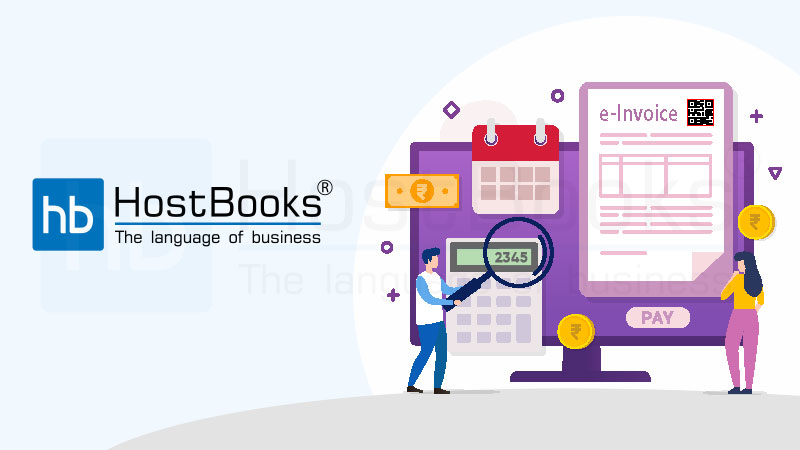
A Complete Guide On E-Invoicing System in GST
March 15, 2021
New Income Tax Changes in Budget 2021 – Every Taxpayer Must Know
March 17, 2021Introduction
The Central Board of Indirect Taxes and Customs i.e. CBIC formally notified the system of e-Invoicing under GST vide Notification No. 68/2019 – Central Tax, which inserted sub-rules (4), (5) and (6) under rule 48 of the CGST Rules, 2017 for the implementation of e-Invoicing.
E-invoice, as evident by name, stands for an electronic invoice. It is a standardised format of the invoice which is prescribed for the suppliers who are registered under the Goods and Services Tax laws. This format is recommended by the Goods and Services Tax Network (GSTN).
Applicability
E-invoicing is a turnover based requirement. Not all the taxpayers registered under GST are required to raise e-invoices The current e-invoice limit is for businesses whose turnover has exceeded 5 cr in any previous 5 financial year. However, for other taxpayers, whose aggregate turnover during the financial year 2019-20 is less than or equal to five hundred crores of rupees are not mandatorily required to issue e-invoices.
For the purpose of determining the prescribed limit of Rs. 500 Crores, an aggregate turnover of all the GSTINs i.e. Goods and Services Tax Identification Number, based on the same PAN is considered.
The taxpayers cannot go for an e- invoicing on a voluntary basis, especially when their aggregate turnover is less than five hundred crores of rupees. However, as per the clarification issued by NIC vide release dated 7th September 2020, the taxpayers can voluntary opt to raise e-invoices if aggregate turnover of their business exceeds an amount of five hundred crores of rupees during any of the previous 3 financial years under GST laws.
Who can generate e-invoice?
After knowing the eligibility to issue e-invoices, next important aspect is the person who can generate such e- invoice, whether the suppliers or recipients or the transporters.
As per Rule 48(4) of CGST Rules 2017, the invoice shall be prepared by such class of registered persons as may be notified by the Government, by including such particulars contained in FORM GST INV-01 after obtaining an Invoice Reference Number, i.e. IRN by uploading information contained therein on the Common GST Portal. This IRN is different from an Invoice number.
Therefore, only the suppliers can generate an e-invoice. The recipients and transporters cannot do so. Even in case of supplies of goods and/or services under reverse charge; i.e. RCM, the supplier is liable to issue e-invoice.
Types of Supplies
accc
E-invoice cannot be raised on all types of supplies. It can only be issued for Business to Business i.e., B2B supplies. Therefore, a supplier having Business to Consumer i.e., B2C supplies cannot issue e-invoice irrespective of his annual aggregate turnover.
Furthermore, e-invoices can be issued for taxable supplies of goods and/or services. It cannot be raised for exempted supplies.
Exemption
However, exemption is provided to certain persons engaged in notified businesses from the implementation of e-invoicing vide Notification No. No.13/2020 – Central Tax, dated the 21st March 2020.
Such exempted category is as follows:
- An Insurer, Banking Company, or Financial Institution including NBFC.
- Goods Transport Agency (GTA).
- Passenger Transport Service.
- Admission to the exhibition of Cinematograph Films in Multiplex Screens i.e. PVR.
- SEZ unit (as amended vide Notification No. 61/2020–Central Tax Dated: 30th July 2020).
This exemption does not apply to a SEZ developer. Hence, it has to comply with the requirements of e-invoicing.
The aforementioned exemption is irrespective of the aggregate turnover of the persons during the financial year from these businesses.
It is to be noted that the relaxation from e-invoicing, in the form of exemption, is provided to the notified business. Hence, if a person is engaged in multiple lines of businesses, under the same GSTIN, then for those business which do not fall under the exempted category, he shall comply with the implementation of e-invoicing when his aggregate turnover exceeds the prescribed limit during the financial year.
Types of Documents
Now the question arises as to whether e-invoicing is applicable on all kinds of invoices used in practice before the implementation of e-invoicing. The answer to this is e-invoicing is applicable for certain documents and invoices only which are –
Tax Invoice – B2B, Export Invoices, SEZ developer Invoices, Revised Tax Invoice, Debit note and Credit note. It does not apply on Bill of Supply, Receipt Voucher, Refund Voucher, Payment Voucher and ISD Invoice.

Try HostBooks
SuperApp Today
Create a free account to get access and start
creating something amazing right now!















